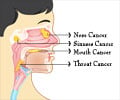Compound in citrus oil called d-limonene reduces symptoms of dry mouth caused by radiation therapy in head and neck cancer patients.
- A compound (D-limonene) in citrus oil could reduce the symptoms of dry mouth, caused as an after-effect of radiation therapy in head and neck cancer patients.
- Radiation produces toxic, highly reactive compounds called aldehydes that kill the salivary cells.
- D-limonene protects salivary cells by reducing aldehyde concentrations
The study will be published online in the Proceedings of the National Academy of Sciences.
Saliva-producing-cells are found in a pair of structures called the submandibular glands situated on both sides of the chin below the lower jawbone. The cells are instrumental in keeping the mouth constantly moist. Also present in the glands are the salivary stem and progenitor cells which rebuild and restore the capacity to make saliva.
How does Radiation Affect Salivary Glands?
Radiation therapy can kill the saliva-producing cells, as well as, the salivary stem and progenitor cells. Retaining the rare but important stem and progenitor cells is critical but especially tricky because, following radiation therapy, toxic, highly reactive compounds called aldehydes are created in the gland, that muddles up cellular function.Head and neck cancer patients who receive radiation therapy suffer the most. About forty percent of them develop dry mouth, known clinically as xerostomia. The patients struggle to speak and swallow and are more likely to develop oral pain or dental cavities. Dental cavities can lead to tooth removal in some cases. There is a chance of recovery in the first years after the therapy, but if saliva production is impaired, it is usually gone for life.
Quynh-Thu Le, co-senior author and professor and chair of radiation oncology specializes in treating head and neck cancer. She has been hearing about the struggles of her cancer patients with dry mouth for a decade now.
In an initial attempt to regenerate salivary stem cells, her lab workers found that the cells contain high levels of an enzyme called aldehyde dehydrogenase 3A1, or ALDH3A1.
ALDH3A1 belongs to the large aldehyde dehydrogenase family of enzymes. These enzymes or proteins initiate or speed up chemical reactions and can decrease the harmful effects of troublesome aldehydes. However, ALDH3A1 cannot combat the radiation-unleashed aldehydes on its own. The enzyme needs to be revved up to be able to tackle the aldehydes.
Chinese Medicine Extracts
Le paired up with Mochly-Rosen who is the George D. Smith Professor in Translational Medicine, and who had been working on aldehyde dehydrogenases for more than a decade. She obtained access to a library of 135 traditional Chinese medicine extracts through this collaboration.The extracts have been used as treatments for various ailments in humans for hundreds of years and hence were safe to use.
What was more important was that seven of the 135 extracts boosted ALDH3A1 activity. Now, it was up to graduate student Julie Saiki, to break apart these complex natural extracts obtained from plants as diverse as tangerine, lotus, an Asian rhizome known as zhi mu in Chinese among many others to find out what, exactly, was activating the enzyme.
The single active ingredient that activated the enzyme, ALDH3A1 was deduced as the compound D-limonene. D-limonene stood out from other compounds in the extracts because it is broken down relatively quickly in the body and is "generally recognized as safe" as a food additive by the Food and Drug Administration.
Study - Testing if D-limonene can Rev Up ALDH3A1 in Living Cells
- In mouse cells exposed to radiation, D-limonene reduced aldehyde concentrations in both adult and salivary stem and progenitor cells.
- D-limonene was capable of improving the ability of the cells to recover, repair gland structure and produce saliva even weeks after radiation exposure.
- Mice that ate D-limonene and were exposed to radiation produced more saliva than mice that did not receive D-limonene and were exposed to radiation.
- Did not boost saliva production so high that mice, or humans, would be drooling.
- Did not increase saliva production in mice that were not exposed to radiation.
- Did not affect tumor growth or interfere with the tumor-shrinking effects of the radiation in mice.
- Stopped the expression of messages that trigger the salivary stem and progenitor cells to self-destruct.
Phase-0 Study - An early clinical trial in a small number of patients
Four patients who were having a salivary gland tumor removed were given D-limonene capsule by mouth for two weeks before the surgery.Post surgery, researchers found high levels of D-limonene in the removed tissue proving that the compound taken orally reaches the salivary gland tissue.
D-limonene can thus be used therapeutically in humans.
Future plans
The next step is to start the clinical trial process. "If it works, then this type of drug would be used safely to prevent dry mouth in patients in the long run and make it much easier for patients to tolerate the radiation treatment with an improved quality of life after the treatment," Le said.Dry Mouth - Xerostomia
Dry mouth occurs when there is not enough saliva in your mouth. It is not a rare occurrence but is present all or most of the time, can be uncomfortable and can lead to serious health problems.Symptoms of dry mouth include a sticky, dry feeling in the mouth and throat, trouble chewing, swallowing, tasting, or speaking, cracked lips, dry and rough tongue, mouth sores, a burning feeling or an infection in the mouth.
Dry mouth is caused due to some medicines, radiation therapy, chemotherapy, and nerve damage. Other causes could be salivary gland diseases, Sjogren's syndrome, HIV/AIDS, and diabetes. Treatment depends on the cause.
References:
- Stanford Medicine. "Compound in citrus oil could reduce dry mouth in head, neck cancer patients". ScienceDaily, (2018).
- Dry Mouth - (https://medlineplus.gov/drymouth.html)
Source-Medindia
















